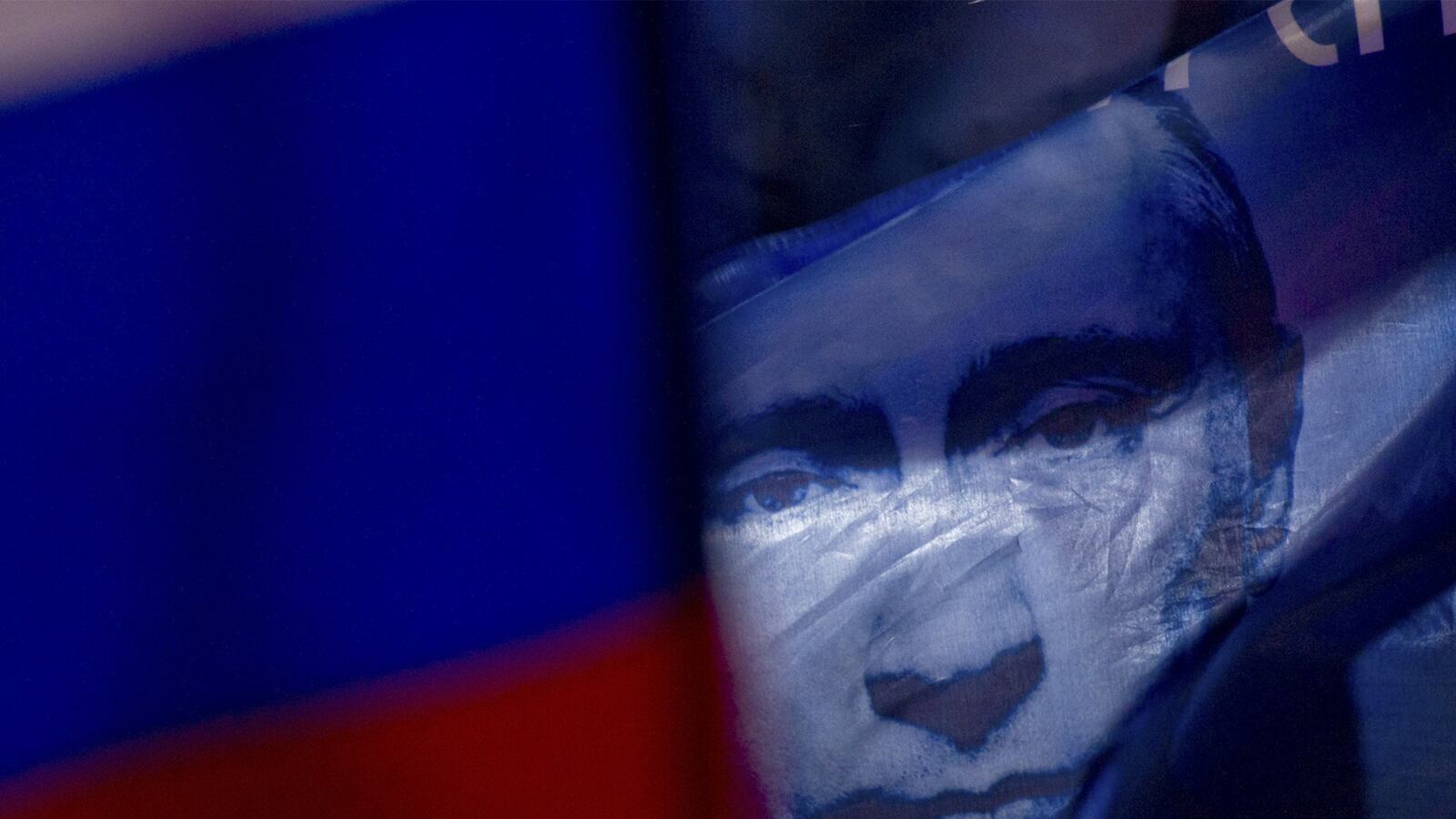Vladimir Putin is everywhere in Crimea these days. His face stares down from the rows of T-shirts cluttering market stands in Sevastopol, which boast tough-guy slogans like “The person who offends us won’t live for more than 3 days!” His portrait graces banners and clothes, and the Russian president is regularly broadcast on Crimean TV screens. Rallies are held in his honor—during one this week, a citizen recited poems she’d written about Putin’s heroism and stoicism.
The omnipresence of Putin’s personality cult in Crimea is a reflection of the Kremlin’s concerted push to portray him as the territory’s savior and protector. Indeed, according to a new documentary, Homeward Bound, which aired on the Rossia television station on Sunday night, Putin personally controlled every step of the Crimea annexation last year, turning the peninsula into a “sea and land fortress.” To demonstrate Russia’s readiness to fight for Crimea, Putin admitted ordering the deployment of K-300P Bastion coastal defense missiles and said that he was even ready to put Russian nuclear weapons arsenal “on alert.”
Translation: Crimea is well protected from any outside threat, be it Kiev, the EU, or even the U.S. But as it turns out, the real threat for those living under Putin’s “fortress” comes from the inside.
Since last spring, detentions, abductions, false accusations, and torture at the hands of local security agencies have become routine in Crimea. To pick just one family’s story—among many similar tales—the former Soviet dissident Abdureshit Dzhepparov lost his youngest son, 18-year-old Islyam, and his nephew, 23-year-old Dzhevdet Isliamov, last September when a group of men in black uniforms pushed the boys into a black vehicle during the middle of the day, in front of witnesses in the family’s hometown of Belogorsk. Neither Islyam nor Dzhevdet have been seen since. Meanwhile, Dzhepparov is sure “my boys were abducted by special security forces.”
Dzhepparov, who is Muslim, says that his older son was killed in Syria in 2013 under murky circumstances. He had been hoping to save up enough money to travel there and look for his son’s body. But Dzhepparov is adamant that it wasn’t the Syria connection that got his younger son snatched; rather, he says, “the boys were abducted for my own activism in the Tatar community.”
Since the mid-1980s, Dzhepparov has been one of the key political activists fighting over land rights for Tatars returning to their homes after decades of deportation under Soviet rule. He had many connections with the Russian dissident community; in 1989, Dzhepparov says, he even attended the great Russian scientist and dissident Andrei Sakharov’s funeral.
After Russia’s annexation of Crimea, Tatar Muslims started to become targets of hate crimes. At least seven male residents of Belogorsk, mostly Tatar Muslims, have gone missing in the past year, including Dzhepparov’s two boys. To press for information on their disappearance, Dzhepparov has become a leader of Contact Group, a community of human-rights defenders and relatives of the disappeared. Every few weeks, they meet with Putin’s deputy in Crimea, Sergei Aksyonov, to find out if there is any new information about their missing friends and family members.
“How did I or my boys offend Russia?” Dzhepparov asked during a recent interview in his now-empty house. He covered his tired eyes with both hands. He said he felt deeply tormented for not forseeing what would come to pass if Russia came to rule over Crimea.
Dzhepparov’s story sounds similar to the “epidemic” of hundreds of abductions by Russian security agencies in the North Caucasus, says Oleg Orlov, the chairman of the Moscow-based human-rights group Memorial. As in Dagestan and Chechnya, “in Crimea people could be ‘disappeared’ by so-called self-defense militias, either for their political views or for their beliefs,” said Orlov. “Some Muslim got in trouble on suspicion of being a part of Hizb ut-tahrir, a community considered extremist in Russia.”
As in the Caucasus, Crimea’s Muslim communities seem to be a prime target for abductions, particularly as the Kremlin suspects the Tatars to be secretly pro-Ukraine. There are at least 60,000 Muslims in Crimea’s Tatar community, around a quarter of the total Tatar population, and their numbers are believed to be growing.
Russian security agents have reportedly searched the houses of several Crimean Muslims for books banned in Russia for extremism. After one such search, two men were found dead; one had signs of torture on him.
Meanwhile, Crimea’s courts are meting out harsh punishments for any activism deemed to be pro-Ukrainian. Last Thursday, a court sentenced three activists and local intellectuals—Leonid Kuzmin, Alexander Kravchenko, and Veldar Shukhurdzhiyev—to prison for demonstrating on the birthday of Ukraine’s most famous poet, Taras Shevchenko. The activists were found guilty for carrying the “extremist” and “forbidden” Ukrainian flag. Just one more victory for the climate of fear in Putin’s new fortress.






